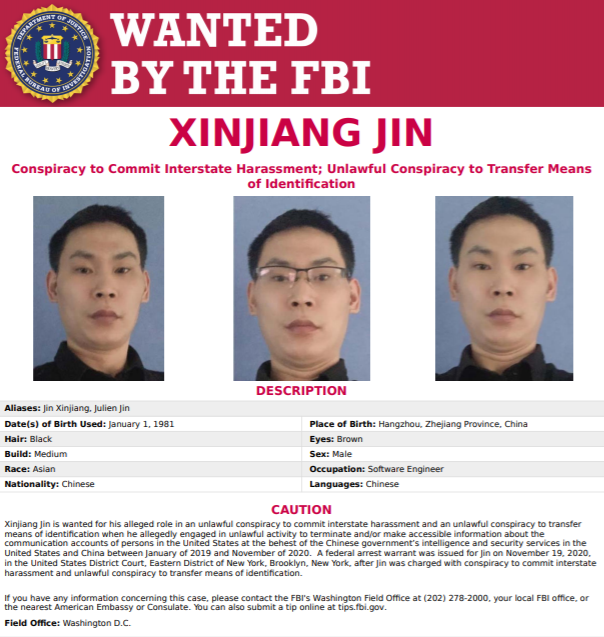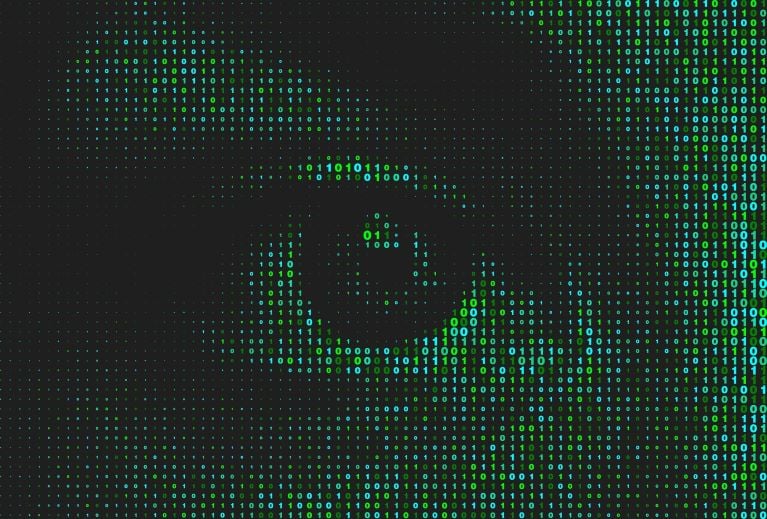A complaint and arrest warrant were recently unsealed in U.S. federal court, charging former Zoom employee Xinjiang Jin, also known as Julien Jin, with several crimes he carried out on behalf of China.
Jin worked for U.S.-based Zoom in the People's Republic of China (PRC).
The FBI says he helped the PRC reveal political opponents and shut down Zoom meetings that took place in May and June 2020. The meetings involved U.S. citizens and were part of efforts to commemorate the 1989 Tiananmen Square massacre.
He also fabricated evidence that hosts and attendees of these meetings were involved with terrorist organizations and the distribution of child pornography.
Jin is believed to be in China, and the FBI released a wanted poster.

Doing business with China can be risky
The U.S. government has long warned organizations, including tech companies, that doing business within China carries extra risk. Organizations are required by law to cooperate with the Chinese government.
Seth D. DuCharme, Acting U.S. Attorney for the Eastern District of New York, says this case if further proof:
"The allegations in the complaint lay bare the Faustian bargain that the PRC government demands of U.S. technology companies doing business within the PRC's borders, and the insider threat that those companies face from their own employees in the PRC.
As alleged, Jin worked closely with the PRC government and members of PRC intelligence services to help the PRC government silence the political and religious speech of users of the platform of a U.S. technology company. Jin willingly committed crimes, and sought to mislead others at the company, to help PRC authorities censor and punish U.S. users' core political speech merely for exercising their rights to free expression.
The charges announced today make clear that employees working in the PRC for U.S. technology companies make those companies—and their users—vulnerable to the malign influence of the PRC government."
Jin's role with the company and PRC
The Department of Justice says Jin was the primary liaison between the People's Republic of China and its intelligence services. In this role, he would adhere to the PRC government's requests for information and terminate Zoom video meetings hosted by his company.
He would also provide the PRC with information relating to users located outside of the PRC. One thing he would keep an eye out for was any communications that the Chinese government deemed to be "illegal," which includes political or religious subjects that were unacceptable to the Chinese Communist Party and the PRC.
Here are a few claims made by the Department of Justice regarding the actions of Jin:
- "Jin and others conspired to use Company-1's systems in the United States to censor the political and religious speech of individuals located in the United States and around the world at the direction and under the control of officials of the PRC government.
- Jin and others terminated at least four video meetings hosted on Company-1's networks commemorating the thirty-first anniversary of the Tiananmen Square massacre, most of which were organized and attended by U.S.-based participants, such as dissidents who had participated in and survived the 1989 protests.
- Jin and others acted to disrupt meetings held on the Company-1 platform to discuss politically sensitive topics unacceptable to the PRC government by infiltrating the meetings to gather evidence about purported misconduct occurring in those meetings.
- Jin and his co-conspirators fabricated evidence of TOS violations to provide justification for terminating the meetings, as well as certain participants' accounts.
- Jin's co-conspirators created fake email accounts and Company-1 accounts in the names of others, including PRC political dissidents, to fabricate evidence that the hosts of and participants in the meetings to commemorate the Tiananmen Square massacre were supporting terrorist organizations, inciting violence or distributing child pornography.
- The fabricated evidence falsely asserted that the meetings included discussions of child abuse or exploitation, terrorism, racism or incitements to violence, and sometimes included screenshots of the purported participants' user profiles featuring, for example, a masked person holding a flag resembling that of the Islamic State terrorist group.
- PRC authorities took advantage of information provided by Jin to retaliate against and intimidate participants residing in the PRC, or PRC-based family members of meeting participants. PRC authorities temporarily detained at least one person who planned to speak during a commemoration meeting.
- In another case, PRC authorities visited family members of a participant in the meetings and directed them to tell the participant to cease speaking out against the PRC government and rather to support socialism and the CCP."
Should Jin be found guilty of the two charges—conspiracy to commit interstate harassment and unlawful conspiracy to transfer a means of identification—he would face a maximum of 10 years in U.S. prison.
Are any of your employees in China acting on behalf of the PRC? This insider threat case reminds us it is a question worth considering.





